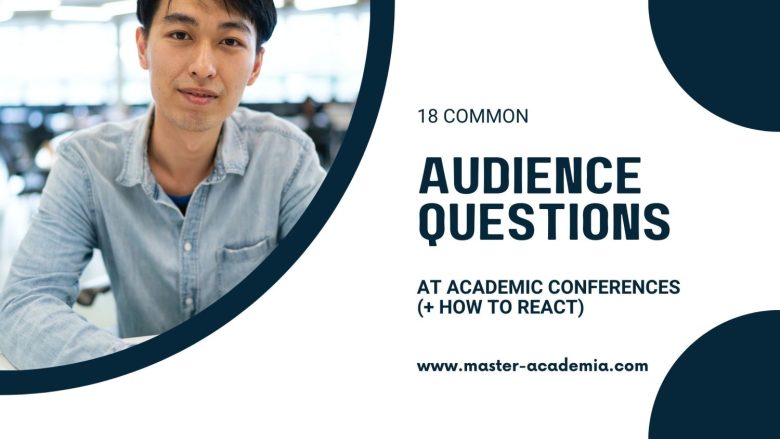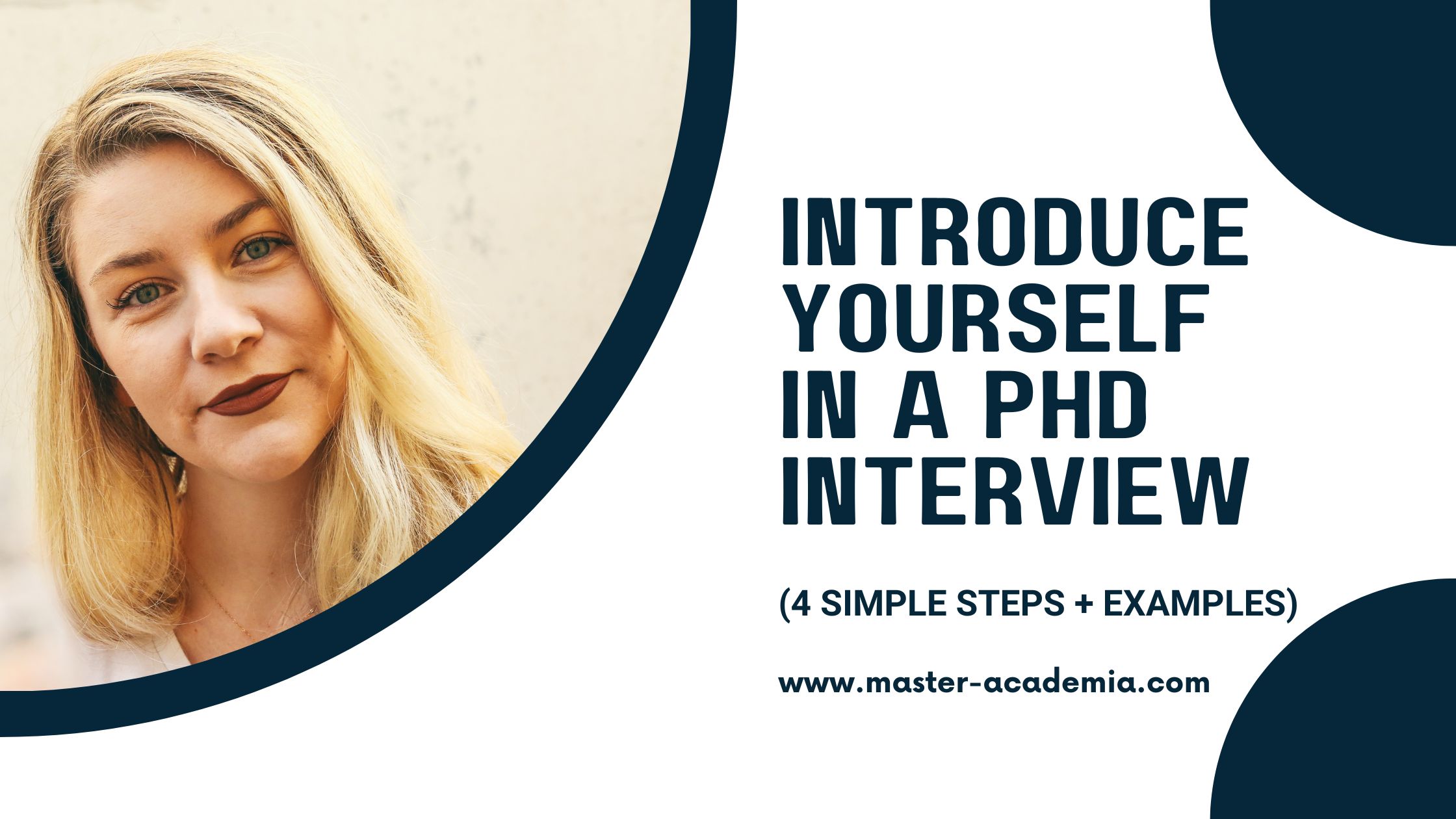
While you can practice your conference presentation a hundred times, audience questions are more difficult to prepare for. Nonetheless, several typical audience questions are frequently asked at academic conferences. Be aware of these questions and know how to react!
Contents
- Common audience questions about your key contribution
- Common audience questions about research relevance
- Common audience questions about literature and theory
- Common audience questions about the research process
- Common audience questions about research avenues not taken
- Common audience questions about research limitations
- Common audience questions about future research
Common audience questions about your key contribution
What is your main argument?
How to react: You probably raised many interesting points in your presentation. But what is the key message that you want to convey to your audience? This is your core argument: an umbrella statement, in simple language, no longer than two sentences.
Carving out your presentation’s core argument is not an easy task, so it is good to prepare this in advance.
How do your insights differ from previous studies?
How to react: Be prepared to talk about the unique characteristics of your research findings. For instance, outline how your findings diverge from previous studies.
You can also criticise previous studies in your answer. However, do this respectfully. Don’t say “previous studies are useless because they don’t look at…”. Instead, say “one aspect that previous studies have not considered is …” or “one element that has been under-researched so far is …“.
What is your theoretical contribution?
How to react: This question specifically targets your contribution to theorising about your topic or the relationships that you address in your research.
To prepare a good answer, think about several dimensions. Does your research confirm or contradict a specific aspect of a theoretical relationship? Does your research highlight the importance of a specific aspect that should be considered in theories related to your topic? Does your research uniquely combine different theories?
Common audience questions about research relevance
What is the scientific relevance of your research?
How to react: Most likely, you could have asked hundreds of different questions in your research. Instead, you chose one specific one. Therefore, the person asking this question wants to hear why you think that your specific research focus matters.
Be prepared to provide a clear explanation of why you think your research is relevant to gain new insights on your research topic and to make progress in your scientific field as a whole.
What is the societal relevance of your research?
How to react: Academic research increasingly focuses on societal impact: the impact that research can have beyond the confines of universities and beyond abstract, theoretical knowledge.
Therefore, be prepared to highlight how your research can inform or improve certain practices. For instance, think of a social or environmental challenge. How does your research connect to ‘real life? Why does it matter? And how can your research contribute to a turn for the better?
Common audience questions about literature and theory
How do you define … ?
How to react: Some of the most common audience questions centre around clarifications on specific terms and concepts used in a presentation. While you should already be as clear as possible during your presentation, be prepared to explain your definitions of key terms and concepts more in-depth during the Q&A.
Furthermore, be prepared to embed your understanding or definitions of keywords and concepts within the existing literature. Did you follow a definition of a certain scholar? Or does your understanding of a term differ from the way it is commonly understood in scientific work on the topic?
What is your theoretical framework?
How to react: Theories can be considered as systems of general principles which explain a specific phenomenon or relationship of interest. Many empirical studies combined contribute to the theorisation of such phenomenon or relationship. A theoretical framework builds the backbone of your research.
Thus, be able to explain your theoretical framework. Which theories built the foundation of your research? What were your hypotheses based on? Which established ideas allowed you to predict your findings?
What is your conceptual framework?
How to react: Your conceptual framework is embedded in your theoretical framework, but concretely describes the variables (and their relationships) that you address in your study. In a way, a conceptual framework provides a roadmap for your research.
To explain your conceptual framework, you have to be prepared to identify the variables (e.g. the factors, elements or features) that you studied.
Common audience questions about the research process
How did you collect your data?
How to react: In a conference presentation, you will not always have time to explain your data collection process in detail. Many people attending academic conferences, however, are interested in this process.
The question on data collection can be answered skillfully if you can provide information on your data sources and data gathering. You can also share some of the challenges you experienced when collecting data, and how you overcame them.
What did you do to prevent research biases?
How to react: Research biases are systematic errors that can occur during your research process. Think of your sample choice, what and how you ask questions during interviews, the type of numerical data you collect, or the way you set up your research design.
You can react to this question by explaining different measures that you employed to reduce biases in your research. However, you can also explain that you are very much aware of how your worldview shapes your research practice, and reflect on what this means for your findings.
Common audience questions about research avenues not taken
Have you considered the work of … ?
How to react: When doing research, you simply cannot incorporate everything and everyone. At some point, you need to make a decision. However, many presenters at academic conferences are asked whether they considered incorporating the work of specific scholars working on similar topics.
There are two options to react. First, you may know the mentioned scholar’s work and can provide a good explanation of why you did or did not include his/her work. Second, you have no idea who that person is. No need to panic! Answer this: “I am not familiar with this work, but it sounds interesting and I would love to chat after this presentation to learn more about it.“
Why did you not use the method of … ?
How to react: Not only are presenters often asked whether they considered specific scholarly work in their research, but also whether they considered a specific method.
When you react to this question, you can be completely honest. Maybe you did not use a specific method because of time or budgetary constraints. Maybe you are not familiar with the named method. Or maybe you simply don’t believe that the suggested method would have generated any valuable findings.
If you could start over, what would you do differently?
How to react: The person asking this question wants to hear what you learned throughout your research process. Be prepared to answer this question by reflecting on your mistakes and detours along the way.
When reacting to this question, it is important to show a high degree of self-reflection. Additionally, it helps if you don’t take yourself too seriously. For instance, when you share a mistake or unfortunate incident.
Common audience questions about research limitations
What are the limitations of your research?
How to react: Every research has limitations. And being able to be explicit about your research limitations is a sign of strength, not weakness!
Therefore, be prepared to point out the limitations of your research, showcasing that you are humble and well aware that research is never perfect.
Are you able to generalise your findings?
How to react: A lot of audience questions centre around the generalisability of findings. The way you respond to these types of questions may differ depending on whether you conducted quantitative or qualitative research.
For quantitative research, you can more easily refer to numeric criteria that indicate whether you can generalise findings or not. For qualitative research, generalisation may not have been the objective, to begin with. Nonetheless, we can learn from the insights. Be prepared to explain your stance on generalising your findings.
Common audience questions about future research
How will you continue your research?
How to react: A good researcher never runs out of questions, and this question asks you what you will do next. When answering this question, make sure that your research plans are linked to your current research presentation.
For instance, which elements would you like to explore that were not covered in your research yet? Which relationship do you plan to investigate further? What is your next research step, building upon your current findings?
What are your suggestions for future research?
How to react: Individual researchers cannot cover everything about an interesting topic on their own. Therefore, a common audience question focuses on research suggestions for other scholars.
Be prepared to share your suggestions for future research with the audience. These suggestions should find a good balance between being broad and concrete enough to inspire others.
What is your advice for people studying a similar phenomenon?
How to react: This is a fun question! It asks you to share your wisdom. Yes, yours! Having conducted your research means you have valuable lessons to share with others embarking on a similar journey.
It can be difficult to come up with good advice on the spot, so make sure to have a few answers up your sleeve. You can, for instance, advise people to start the data collection earlier, to work closely with external partners, or to be open about changes in the research process.



